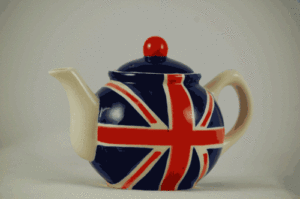 Dr Carrie Ruxton separates fact from fiction with the nation’s favourite drink.
Dr Carrie Ruxton separates fact from fiction with the nation’s favourite drink.
Drinking four to six mugs of tea a day is just as good as drinking a litre of water when it comes to keeping the body hydrated, according to a groundbreaking clinical study published in the scientific journal, The British Journal of Nutrition. The research, commissioned by the Tea Advisory Panel (TAP), has found that drinking up to six mugs of tea a day is just as hydrating as the equivalent volume of plain water – with no negative health effects.
The findings, published in the British Journal of Nutrition, shatter the common – but hugely flawed – notion that regular tea drinking can dehydrate the body, depriving it of vital fluid necessary for optimal mental and physical health. The misconception stems from some previous research on caffeine pills, which, at high doses, can increase the frequency of urination. Tea is a moderate source of caffeine, containing around 50mg per mug.
Until this study there has been little conclusive evidence whether or not caffeine in drinks, such as tea, could provoke excessive urination and dehydration. However the latest study – a randomised controlled trial – has finally demonstrated that, as an everyday drink, tea has the same beneficial hydrating properties as water.
Commenting on this latest published study, independent dietitian and nutrition advisor to the Tea Advisory Panel, Dr Carrie Ruxton notes: “Tea and water were found to offer similar hydrating properties at intakes of up to six cups, making tea an excellent way to maintain healthy fluid levels. In addition, tea is a rich source of flavonoids, which have been associated with a reduced risk of heart disease and stroke. Thus, tea could be considered a healthy choice of beverage. Not only is a mug of tea refreshing and delicious, it can be an important part of maintaining proper hydration.”
Black tea offers the same health benefits as green tea, according to a new research paper just published in Network Health Dietitians. Given that both black and green teas come from the same plant – Camellia sinensis – and contain similar plant compounds, this may not surprise health experts. However, green tea often gets more attention for its benefits leading to confusion amongst consumers.
Dr Ruxton highlights the benefits of black tea in relation to cardiovascular health, diabetes, cancer and dental health. Most notably, her research finds that black and green tea offer almost identical benefits in relation to cardiovascular health.
When weighing up the relative benefits of green versus black tea, Dr Ruxton notes: “Studies that have looked at both types of tea have confirmed similar improvements in vascular function when black or green teas are drunk, leading to significant reductions in stroke risk. A Japanese study found a 30% reduction in cardiovascular mortality in women when green tea was drunk frequently. Studies on black tea offer a similar picture with a number of observational studies reporting significant associations between black tea consumption and a lower risk of cardiovascular disease. Further analysis revealed that the risk of myocardial infarction (MI) was 11% lower, on average, when 3 cups of black tea were consumed daily. The longitudinal Rotterdam study found a 46% lower risk of severe aortic atherosclerosis[i] (blockage of the body’s major artery) and a 43% lower risk of MI[ii] when black tea was drunk once or twice a day. These are supported by intervention and mechanistic studies which confirm that green and black teas have similar physiological effects in the body.
“My research review also found that black tea is linked with a reduced risk of diabetes and that tea constituents, such as flavonoids, may reduce cancer risk. For black tea intake, the most consistent evidence here relates to bowel cancer. Black tea also appears to offer dental health benefits as tea flavonoids inhibit Streptococcus mutans, the species of bacteria mainly responsible for dental caries. According to new clinical research, drinking up to 6 cups of black tea a day can make an important contribution to fluid requirements, while still keeping caffeine levels within safe limits.”
In conclusion Dr Ruxton adds, “It is vital not just to consider the amount of high quality research evidence about tea, but the cultural context and availability of these beverages for British people. The National Diet and Nutrition Survey reveals that 77% of adults in the UK drink black tea with an average intake of 2.3 mugs per day. In contrast, there are no reliable estimates of green tea consumption as it remains a niche beverage. Overall, black and green teas seem to offer identical health benefits at intakes of around four cups per day for black tea and 5-6 cups per day for green tea (due to the smaller cup traditionally used). However, because of its relative popularity, lower cost and wider availability, people in the UK will be more likely to get their daily Camellia sinensis from black tea.”
Tea and Type 2
 Drinking at least three cups of tea a day is linked with reduced risk of type 2 diabetes, according to a new Dutch study published this month.[1]
Drinking at least three cups of tea a day is linked with reduced risk of type 2 diabetes, according to a new Dutch study published this month.[1]
This was a prospective cohort study involving 40,111 people who were followed up for a period of 10 years. Tea (and coffee) intake was determined by use of a food frequency questionnaire. The questionnaire was validated by checking its results against 12 months worth of 24 hour recalls of food and drink intake in 121 participants before the start of the study.
Commenting on the research, Dr Ruxton says: “This study reveals a strong inverse association between tea consumption and risk of type 2 diabetes. Drinking at least three cups of tea a day was linked with a 42% reduced risk of type 2 diabetes. Drinking more than 3 cups of tea did not substantially reduce this risk any further. The study did not distinguish between black and green tea, but 95 per cent of tea drunk in the Netherlands is black tea, i.e. regular tea.
“The results remained the same even when the researchers accounted for other factors which might have influenced diabetes risk, such as body mass index, blood pressure, caffeine, dietary magnesium and potassium. This suggests that ingredients other than caffeine, magnesium and potassium (all found in tea) could be causing the beneficial effect. Likely candidates are the flavonoid antioxidants found in tea which are known to protect body cells from damage.”
Dr Ruxton adds: “This study is not the first to look at the relationship between black tea and diabetes. Research published last year found that regular consumption of black tea was linked to a reduced risk of developing type 2 diabetes[2]. This was a large, prospective study, involving 36,908 Chinese men and women, aged 45 to 74 (mean age 54.8) years, living in Singapore. Those who drank more than one or more cups of black tea each day were 14% less likely to develop diabetes. These benefits of black tea were thought to be due to improved glucose metabolism, increased anti-inflammatory activity and increased insulin activity.
“This Dutch paper expands our knowledge of the association between black tea and type 2 diabetes. In the UK, there are currently over 2.3 million people with diabetes, more than half a million people have diabetes and don’t know it, and the incidence of the condition is increasing. [3] If black tea proves to be beneficial in helping to lower diabetes risk, this is good news for the large number of people in the UK who drink black tea.”



